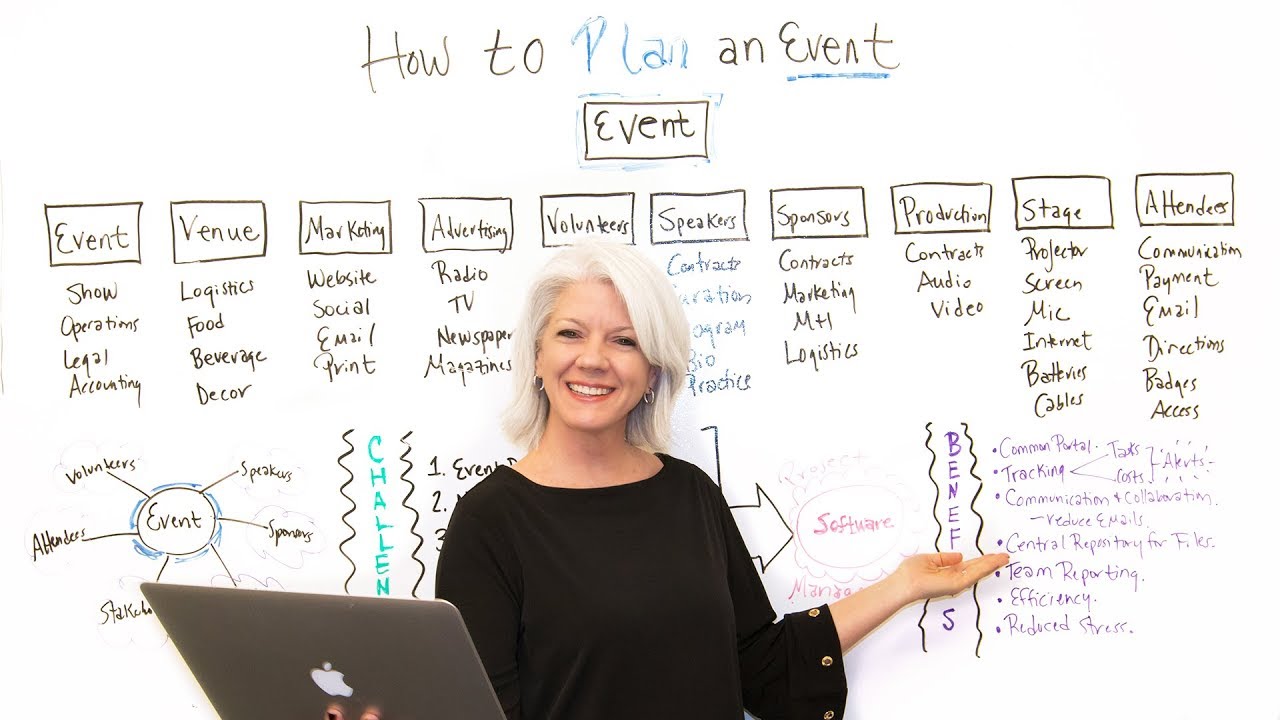Organizing an eventcan be a very enjoyable and rewarding experience. Although there is more work involved than most of your participants realize, seeing your first event come to life from an idea is ultimately very rewarding for event directors. The following are some of the most important steps to take when planning, promoting, and executing your first event.

How to Plan an Event - Project Management Training
Organizing An Event Essential Tips
Learn how toorganize an event. A successful event necessitates effort. To get you started, we've compiled a list of the top 10 tips for organizing your first event. Starting with a strategy ensures success. And, if you play your cards right, you can deliver a world-class experience even on your first try.
Identify The Purpose In Order To Have A Successful Event
Above all, begin by asking yourself why you are holding the event. Summarize the activity's main goal. You can plan the event in a way that aligns with your strategic thrust if you identify the goals early on. As a result, before you begin planning an event, you must first define its purpose. You won't be able to create a comprehensive event plan without it. Establish KPIs so that you can measure results and thus optimize the event from the start. You can now begin planning the event.
Coordinate Your Team Members And Event Planners
A successful event necessitates the participation of many different people. Begin by deciding who will be involved and what their roles will be throughout. This helps to streamline work and prepares you for questions as more people are brought in. Someone should be in charge of communicating with the people in charge of each area. These latter, in turn, are to assign tasks within their teams. This ensures that things move along smoothly as the event approaches.
Find A Venue To Kick-start The Event Planning
The location is extremely important. As a result, make an effort to find potential venues and carefully select the D-day location. Check out what hotels and conference facilities have to offer if you're planning a businessconference. If you're organizing a craft fair, look for open, industrial spaces that are easily accessible by public transportation. Set a date and determine the cost ahead of time. This way, you'll know how much to charge for tickets.
Set An Event Date
Don't pick an event date at random. Consider target audiences and ensure that they are generally able to attend. If you are organizing a businessconference, you should look for competing eventsand make sure that potential sponsors and participants will not be attending them. Also, avoid public holidays when people are likely to travel. (Unless you're planning and marketing a music festival as the ideal way to spend a stay-at-home holiday.)
Book Attractions To Organize The Event
You should aim high while staying within your event budget to ensure that the attractions draw people in! Consider which types of speakers or performers would be most appealing to your audience. Who are the most attractive personalities available to address your target group if you are holding a business conference? If you are planning an event for parents, consider their daily challenges and find an expert who can address the chosen topic.
Create The Programme
After you've secured the main speaker or performer, it's time to plan the program's structure. Naturally, the best slotsmust be set aside for your attractions. Outside of those, you can have panel discussions and other program highlights. For overall event management, you must create a program that keeps participants engaged. Remember to include breaks and pauses for people to network, socialize, and interact with one another.
Bring Sponsors On Board
Determine how you want to collaborate with sponsors. Should they sponsor a specific element of a conference program or a cocktail party? Will you have a display floor where sponsors can pay to showcase their products and services? Consider what best suits your event plan and begin courting potential sponsors who can contribute to the overall show's financing.
Develop A Marketing Plan
Marketing is essential for attracting attendees to your event. Think multichannel to increase attendance. Create an email and distribute it to anyone in your network who may be interested. Encourage them to share it with their friends. Remember that reaching your intended audience is critical.
Launch a coordinated social media campaignusing the channels appropriate for your event. Facebook, LinkedIn, Instagram, and Twitter are all excellent platforms for reaching out to a wide range of demographics. Use a hashtag to keep track of the conversations. Ensure that the event's celebrities and key participants promote your event on their social mediachannels and use the appropriate hashtags. Putting in marketing effort will help your event succeed.
Contact The Press
Gather a list of journalists, bloggers, and radio personalities who you believe might be interested in your event. Send them entry passes to encourage direct reporting from the event. You can also try to ensure that speakers are available for advance interviews so that early media coverage can help spread the word.
Sell Event Tickets
Once you've spent time and effort finalizing the shape of your event, don't forget to check whether registering for and purchasing tickets is simple. Use a simple process on your event website that allows people to get tickets at any time. If you intend to sell tickets at the door, publicize this as the event approaches. This will persuade any doubters to attend.
How To Advertise An Event
Consider who your target audience is when advertising your concert, festival, or sporting event. In addition to traditional targeting, if you are organizing a charity event, you may wish to market through channels other than your usual interest groups. For example, you might want to have the charity you're supporting promote your event through their social media and email list. The charity may be willing to distribute posters and do other volunteer work to assist you in promoting your event. If you have a live concert, you might want to advertise it at other live music events. When marketing your event, consider posting posters or fliers in all retail stores within the radius where you believe the majority of participants will be willing to travel. Sometimes you can find property owners at busy intersections that will allow you to put up a banner on their fence. This can be an inexpensive way to get the word out about your event. Some events will put up dozens of signs to promote their event.
People Also Ask
What Is The Most Important Thing In Organizing An Event?
Size, capacity, location, lighting, and price are all important considerations to bear in mind. If you've already decided on a venue, you can assign tasks to ensure that everything venue-related is completed before the event.
What Is The Difference Between Planning And Organizing An Event?
The Collins Dictionary defines planning as "the process of deciding in detail how to do something before you actually start doing it," whereas organizing is defined as "the activity or skill of coordinating people and events."
Which Comes First Planning Or Organizing?
So, which comes first, planning or organization? Think again if you guessed organizing. Without first establishing the proper priorities, you cannot effectively create structure that ensures the desired results. First and foremost, plan.
The Bottomline
One of the final steps in event planning is to go through each step again once you have a complete view of the event. This will take a long time, but you will be going at a deeper level, which means there will be less room for error.
Write down all of the details so that anyone on your team can read and understand them. When the event day arrives, assume the roles of observer and manager. Manage the guests and the staff, and concentrate on the overall experience provided by the event. Trust your work and preparation, as well as your team.
Understanding how to plan an event is not an easy task, and the larger the event, the more complicated things can become. Understanding your role in event creation, as well as managing your team, will help you not only plan the event but also make it a reality.


